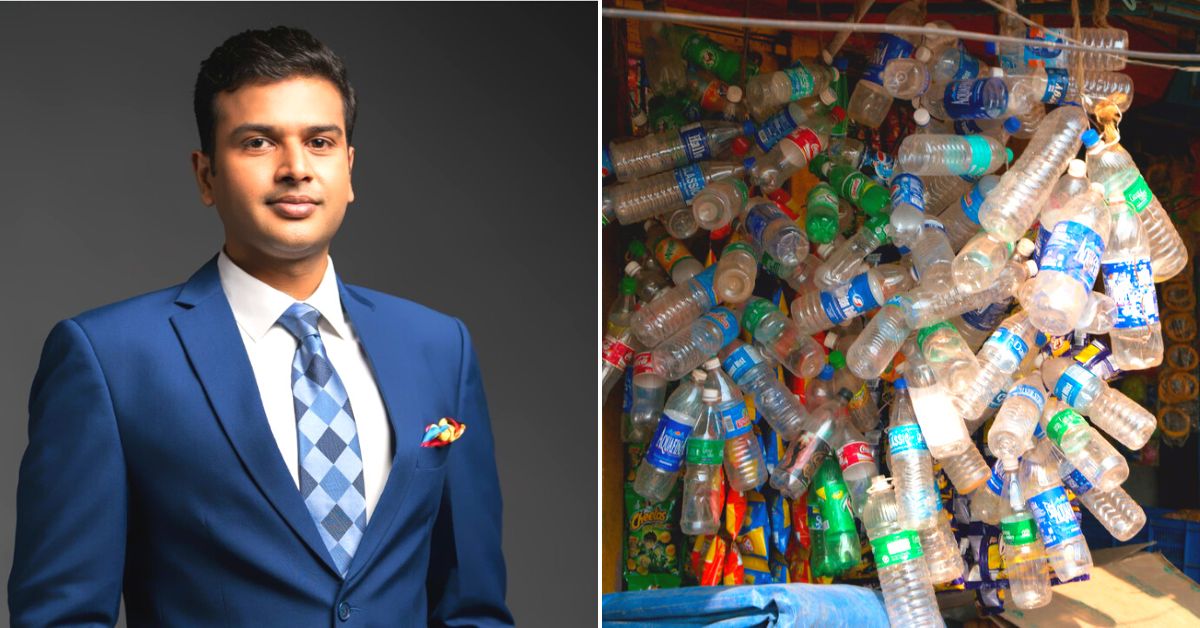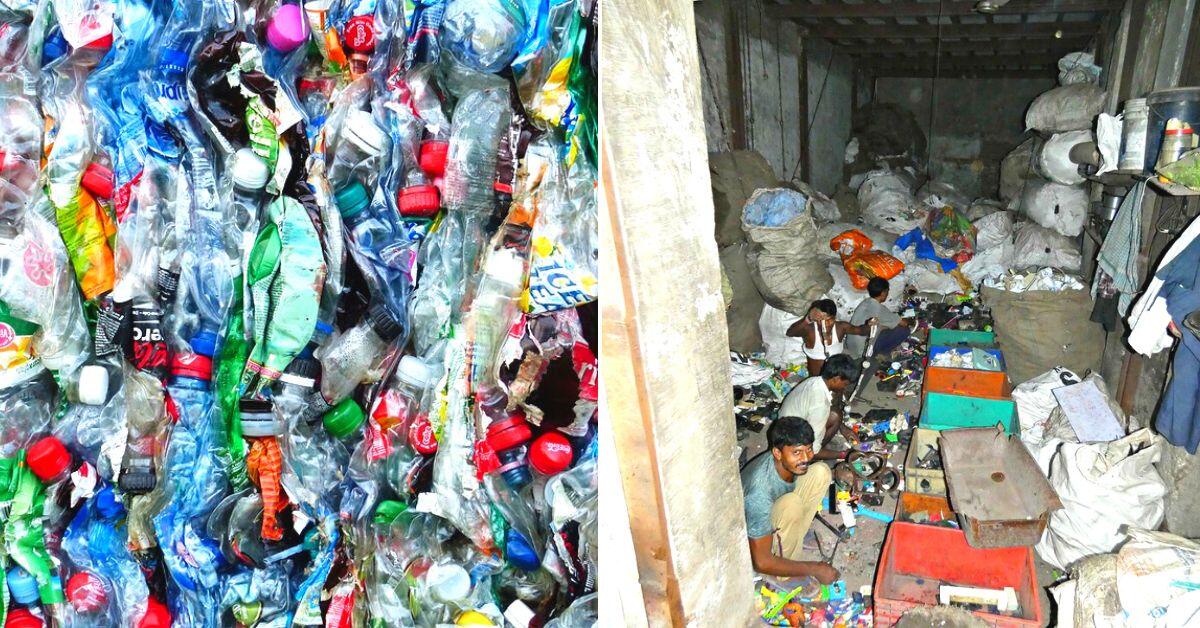ISB Grad Helps Large FMCG Brands Recycle Plastic Packaging & Reduce Waste
Nimit Aggarwal, founder of EcoEx, India’s first digital marketplace that connects plastic producers to a nationwide network of verified recyclers and processors, explains how the firm helps giant brands manage their waste better.

According to Union Environment Minister, Bhupender Yadav, India is generating approximately 3.5 million tonnes of plastic waste annually. Nearly half the manufactured plastic in India is used for packaging purposes, as per media reports. In a bid to contain this surge of waste, the Union Environment Ministry asked companies to collect and recycle at least 25 per cent of their plastic packaging material generated over the last two years.
Further, they have been asked to enhance this target to 70 per cent in the current fiscal. However, from 2023-24 onwards, new guidelines issued by the Ministry will come into play whereby all companies are mandated to collect and recycle 100 per cent of their plastic packaging material. Two critical steps taken by the government in this regard are enforcing the new extended producer responsibility (EPR) guidelines for companies and prohibiting the use of single-use plastic, which has little utility and a high potential for littering, from 1 July 2022.
Earlier this year in February, the minister issued new guidelines regarding EPR on plastic packaging under the Plastic Waste Management Rules of 2016. One standout element of these guidelines is that it will “allow for sale and purchase of surplus extended producer responsibility certificates, thus setting up a market mechanism for plastic waste management.”
The guidelines go onto further state that EPR will be done through a customised online platform. As the notification issued by the Ministry states: “The online platform will allow tracking and monitoring of EPR obligation and will reduce the compliance burden for companies through online registration and filing of annual returns. In order to ensure monitoring on fulfilment of EPR obligations, the guidelines have prescribed a system of verification and audit of enterprises.”
One such online marketplace that is already facilitating the process of plastic waste management has already been set up by a Delhi-based venture EcoEx.
Established in 2018, this is India’s first digital marketplace that connects plastic producers and major brands — like Dabur India, Hindustan Coca-Cola Beverages, Haldiram Snacks and Adani Wilmar — to a nationwide network of verified plastic recyclers and processors.
Its objective is not merely to help major brands fulfil their extended producer responsibility (EPR) regarding plastic waste, but also ensure a transparent, fair, and seamless exchange of plastic credit certificates (PCC).
With EcoEx, Producers, Importers and Brand Owners (PIOBs) can also set off their EPR obligation for specific state/category/quantity by acquiring PCCs directly from recyclers/end of life processors/urban local body-approved collectors.
The government’s EPR guidelines allow these firms to meet compliance targets by buying ‘plastic credits’ from accredited companies that recycle packaging or co-process the plastic packaging waste. PCCs for EPR fulfilment is an internationally accredited method. But how does this system work? Here’s Nimit Aggarwal, managing director and founder, explaining it.
“As per the Government of India’s newly established Plastic Waste Management (PWM) Rules, entities involved in manufacturing, importing, or using plastic as packaging for their products need to collect back the grade and amount of plastic and channelise them for recycling or incineration, based on the grade collected. This waste can either be recycled or sent for incineration in cement, waste to energy, or waste to oil plants. The government may levy heavy penalties in case these entities do not follow the rules,” says Nimit.
PIBOs can fulfil their plastic EPR obligation directly through recyclers/end of life processors via EcoEx’s digital marketplace. A PCC certificate is a seal of approval for brands stating that the plastic waste generated is ethically collected, transported, and put to end of life while also ensuring that the recycling sector receives monetary benefits.
“A plastic credit model envisages that a producer is not required to recycle their own packaging, but ensure that an equivalent amount of packaging waste has been recovered and recycled to meet their obligation. However, producers are mandated to acquire evidence of recycling or recovery [plastic credit] from properly accredited processors [recyclers, waste to energy plant operators, cement co-processors, etc.] or exporters. The producers can exchange credits from processors that have been specifically accredited for this purpose and through proper registration at the EPR portal set up the Central Pollution Control Board (CPCB),” he explains.
EcoEx helps brand owners obtain these certificates from recyclers and make procedures very smooth, as well as complete all documentation and reports, which they can easily submit to the CPCB.
Recyclers registered on the platform set up an inventory of the products they buy or sell, following which they put up an auction for interested PIBOs. PIBOs need to state their quotation requests on the platform for raw waste materials, while EcoEx also allows them to create an annual report of how much plastic they use and trade which they must submit to the CPCB. For every successful trade of raw waste material on the platform, EcoEx receives a 5% commission.

An ‘eco-minded entrepreneur’
An MBA from the Indian School of Business (ISB), Nimit has always considered himself a “fervent supporter of a circular economy”, and believes that the world can truly make progress only when there is a fine balance between economic and environmental growth.
With this belief, he joined BLS Ecotech, a recycling organisation that produces recycled polyester fibre by using PET plastic waste, in 2013. Through his time there, he consulted for many international recycling organisations with their planning and business strategy. Following his stint at BLS Ecotech, he established EcoEx in September 2018.
“Our vision at EcoEx is to spread awareness regarding our platform so that recyclers and all small workers associated with the plastic waste management profession can earn a better livelihood, and major plastic producers can fulfil their EPR obligations without any major hassles. As an eco-minded entrepreneur, I always had a desire to create the right conditions for businesses, irrespective of sector, to operate in a sustainable manner, and in sync with the recycling industry. This desire led to the birth of EcoEx,” he states.
Working with brands, recyclers
Thus far, EcoEx has more than 100 partners on the waste collection and recycling end — over 60 recyclers, two waste to energy plants, five waste to oil plants, over 20 waste management agencies, and more than 40 waste collectors. “All our recycling partners have consent to operate certificates from the given state government and every collection partner has tie-ups and endorsements from ULBs (Urban Local Bodies) tie-ups and endorsements,” claims Nimit.
Before entering the collection and recycling process, EcoEx provides advisory on pre-consumer strategies for businesses to assess their plastic footprint and “create programmes that match their sustainability goals and also helps them to fulfil their EPR liability to ensure plastic neutral status”. Going further, he adds, “EcoExex is upscaling the recycling industry by guiding them to register with government portals and help them make the transition from unorganised to the organised sector.”
So far, the venture claims to have executed 70,000 MT (metric tonnes) of plastic credit transactions for their clients and aims to achieve 100,000 MT this financial year.
Road ahead
EcoEx realised the need to get the unorganised recycling sector to the organised segment by educating them about the additional monetary benefits they can get by way of selling PCCs to the pool of PIBOs directly on their digital marketplace. This in turn paves way for streamlining the recycling industry.
More importantly, however, this is about reducing carbon emissions and educating stakeholders. Recycling plastic causes lesser CO2 emission as compared to producing virgin plastic, since “the upstream energy necessary to produce one ton of new product saves about 2 tons of CO2 annually”. EcoEx, by way of empowering recycling infrastructure through its digital marketplace, is looking to help communities breathe cleaner air.
“Sadly, a lot of PIBOs and recyclers are not even aware of EPR. EcoEx aids in creating awareness by playing a vital role in educating both PIBOs as well as recyclers about the need to ethically offset their EPR targets. Looking forward, we will also target other stakeholders in waste management including e-waste, rubber and tyre, glass, batteries, etc.,” he says.
Today, the venture competes with waste management agencies and other similar waste exchange platforms like Sanshodhan, EPR Loop, Alucha and Cercle X. With a strong presence in states like Delhi, Rajasthan, Uttarakhand, Uttar Pradesh and Chhattisgarh, Nimit claims that the company has earned commissions worth Rs 6 crore since its market launch in 2018.
Click here to find our more about EcoEx.
Sources:
Start recycling 25% of plastic packaging material, MoEF asks industry: Written by Kalyan Ray for Deccan Herald, Published on 19 February 2022
India Wants Manufacturers To Manage Plastic Waste. Here’s How Proposed Rules Fall Short: Written by Bhasker Tripathi for IndiaSpend, Published on 5 October 2020.
(Edited by Divya Sethu)
Like this story? Or have something to share? Write to us: [email protected], or connect with us on Facebook and Twitter.
If you found our stories insightful, informative, or even just enjoyable, we invite you to consider making a voluntary payment to support the work we do at The Better India. Your contribution helps us continue producing quality content that educates, inspires, and drives positive change.
Choose one of the payment options below for your contribution-
By paying for the stories you value, you directly contribute to sustaining our efforts focused on making a difference in the world. Together, let’s ensure that impactful stories continue to be told and shared, enriching lives and communities alike.
Thank you for your support. Here are some frequently asked questions you might find helpful to know why you are contributing?


This story made me
-
97
-
121
-
89
-
167













